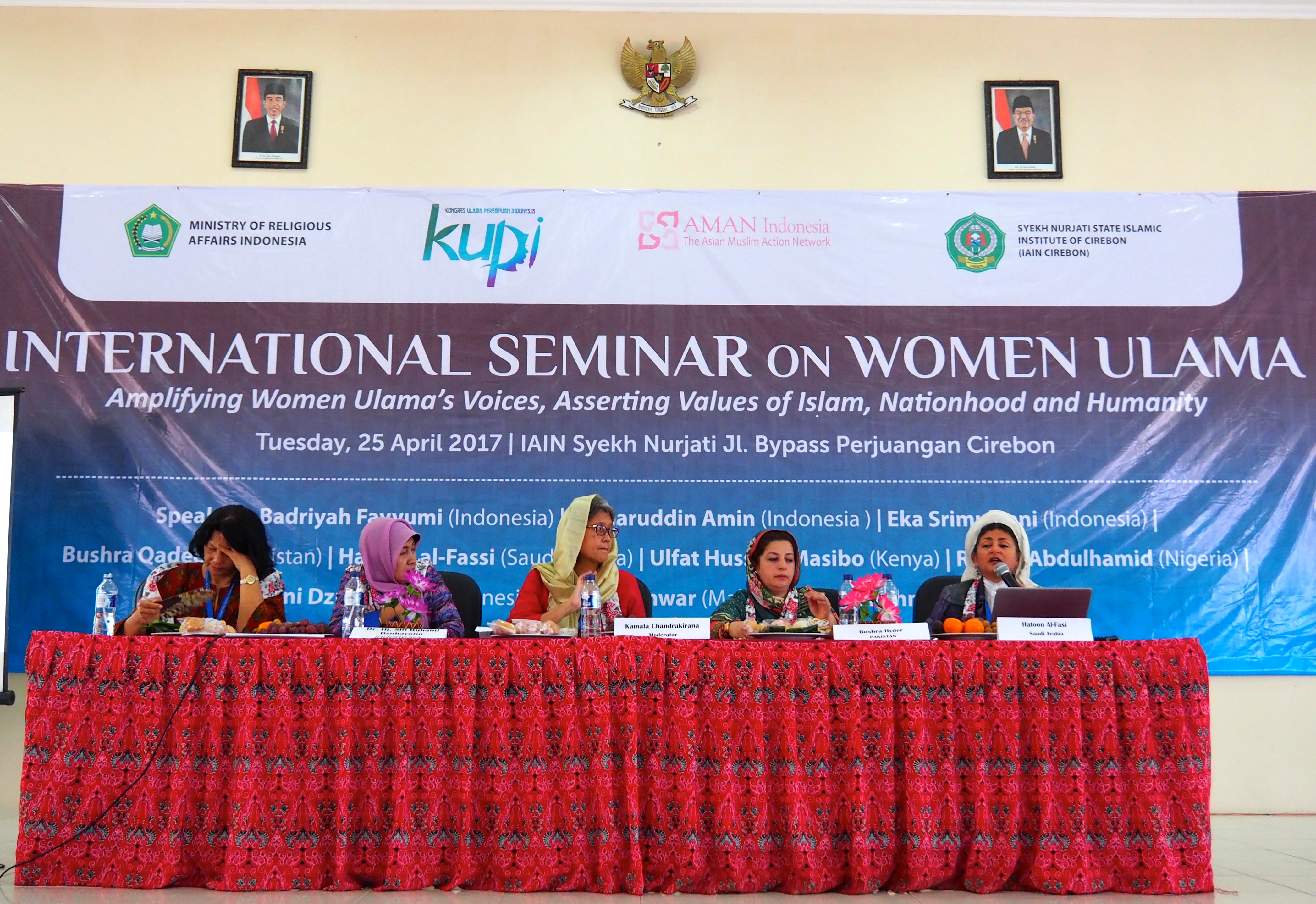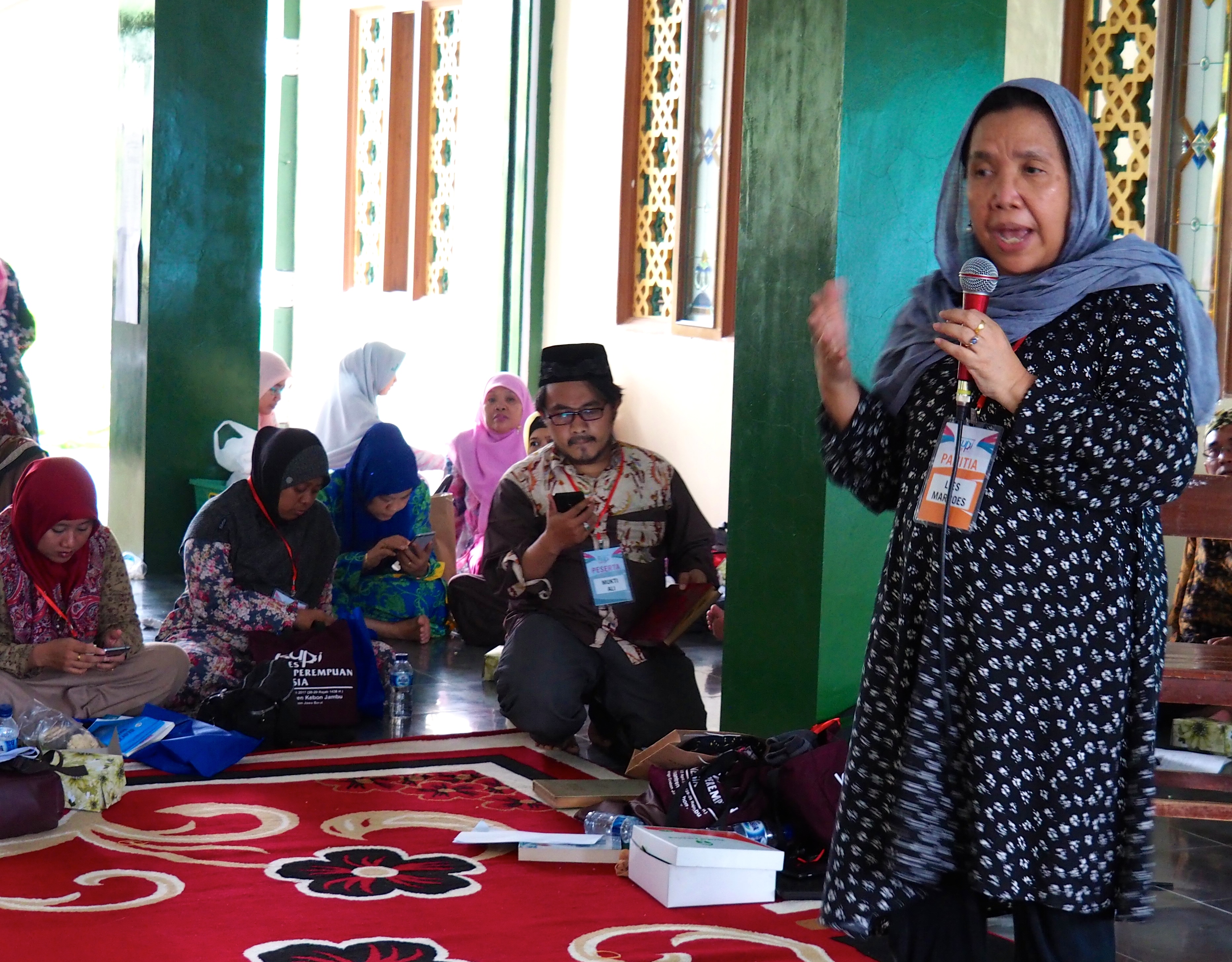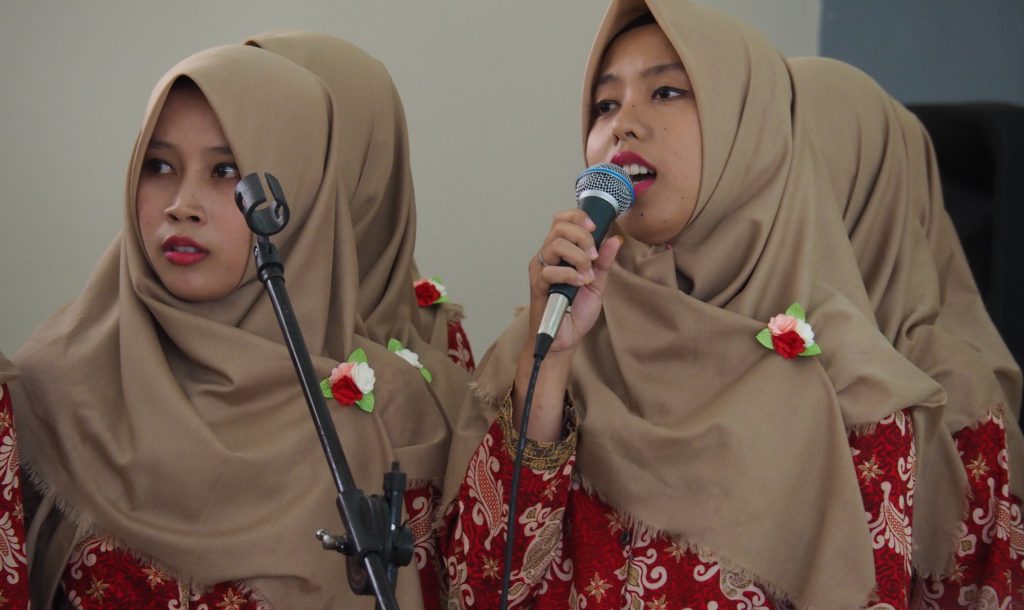Islam, the religion of the vast majority of Indonesian citizens, is a site of contestation in envisioning Indonesia’s future. Gender equity as a democratic value has been a strong claim since the fall of Suharto. Recent international focus has been on the Jakarta gubernatorial elections and the campaign against Chinese background Christian governor Ahok by hard-line Islamists, ending in his blasphemy trial and conviction (and electoral loss). While his Islamist opponents—apparently allied with crony capitalists—have seized media attention, their vision of Indonesia’s future under sharia law is not uncontested.
In April, Indonesian religious scholars and activists hosted a world first: a convention of female religious authorities (ulama). The conference title, KUPI (Kongres Ulama Perempuan Indonesia), played with a dual meaning: female religious authorities, and scholars (male and female) whose interpretations of the Qur’an and Hadith proclaim gender equity (kesetaraan jender) as a fundamental principle of Islam. Over three days, speakers and delegates discussed the history of female religious authority in Indonesia—a claim that is highly contentious to hard line groups who argue that male authority, as prayer leaders and hence as political leaders, is a fundamental Islamic principle. They also discussed the more abstract concepts of social justice and human rights, as fundamental Islamic values focusing on issues like sexual and domestic violence and child marriage.
 Day one was an international seminar (pictured above) where female speakers from other majority Muslim nations, including Saudi Arabia, Pakistan, The Sudan and Kenya (which has a substantial Muslim minority) joined leading Indonesian female ulama. Many of the international speakers commented that it would be unthinkable to have such a convention in their countries, and in particular they would not get official support, as this convention did. A representative of the Minister of Religious Affairs (which regulates Islamic affairs including education and marriage) and the local district head (bupati) both spoke at the opening ceremony, and the Minister of Religious Affairs, Lukman Hakim Saifuddin, closed the conference on the third day. The first day ended in a pageant where seven women ulama from across the country enacted the sources that would be used in developing the fatwa that would outline the main findings of the conference: these included the Qur’an; Hadith (Prophet traditions); Kitab Kuning (‘Yellow Books’—the books of religious instruction used in Islamic schools [pesantren]); the Indonesian Constitution and international instruments like the UN Declaration on Human Rights.
Day one was an international seminar (pictured above) where female speakers from other majority Muslim nations, including Saudi Arabia, Pakistan, The Sudan and Kenya (which has a substantial Muslim minority) joined leading Indonesian female ulama. Many of the international speakers commented that it would be unthinkable to have such a convention in their countries, and in particular they would not get official support, as this convention did. A representative of the Minister of Religious Affairs (which regulates Islamic affairs including education and marriage) and the local district head (bupati) both spoke at the opening ceremony, and the Minister of Religious Affairs, Lukman Hakim Saifuddin, closed the conference on the third day. The first day ended in a pageant where seven women ulama from across the country enacted the sources that would be used in developing the fatwa that would outline the main findings of the conference: these included the Qur’an; Hadith (Prophet traditions); Kitab Kuning (‘Yellow Books’—the books of religious instruction used in Islamic schools [pesantren]); the Indonesian Constitution and international instruments like the UN Declaration on Human Rights.
The mention of the constitution as a source of principles for Indonesia’s Muslims is a direct challenge to the Islamist desire to have sharia law as the basis of Indonesia’s legal system. Further, the emphasis on international instruments challenges the attack by hardliners on what they see as ‘alien’ and ‘liberal’ values. The women also held up small trees representing the environment, indicating the role of Islamic values in stopping rapacious destruction of the environment as another key issue.
The international speakers outlined that while gender equity is a struggle in all the countries represented, in many places they face struggles already won by women in Indonesia. For example, the speaker from Saudi Arabia discussed the campaign ‘I am my own wali’ (guardian): Saudi women need their male guardians’ permission to marry (and travel abroad or have medical treatment) whereas for Indonesian women, the issue is the discrepancy in the minimum age of free choice of marriage for female Indonesian citizens between different legal instruments. The speakers from Pakistan, The Sudan and Nigeria discussed the sensitive issue of how women educators combat radicalism through working with young people and with mothers of radicalised youth.
Siti Ruhaini Dzuhayatin, a notable Indonesian female cleric who currently heads the Independent Human Rights Commission of Organization of Islamic Co-operation (IOC) was another international speaker. She argued for Islamic values protecting human rights and that the Qur’an basically pushes for monogamy, accommodating and humanising polygamy which was a pre-Islamic practice and not part of Islamic teaching. Another instance of international co-operation in promoting women-friendly Islamic values was reported by Zainah Anwar, a founder of Sisters in Islam in 1998 which has now developed an international organisation Musawah, a ‘global movement for justice and equity in the Muslim family’. She praised Indonesia’s record on gender equity, while acknowledging the challenges still to be faced.
The congress attracted nearly 2000 registrants—more women than men, and a mix of scholars and activists, of all ages. There were delegates from all over Indonesia. It was held at the State Islamic Institute and also on the campus of the pesantren (religious boarding school) Kebon Jambu Al-Islamy in Cirebon, West Java, which is headed by a woman scholar, Nyai Hj. Masriyah Amva. The congress site had a carnivalesque atmosphere, with small stalls selling clothes and food, banners lining the entrance road, a tent erected for the opening ceremony and some plenary discussions, and cultural and music performances, including many performances of Shalawat Keadilan, or joyous songs in praise of the Prophet with a theme of equity. These popular renderings of Islamic values have been promoted by the groups that organised the congress as a way of bringing their interpretation to a wide audience.

Violence against women and women’s rights within marriage and the family were key issues. The Cirebon cleric Kiyai Haji Hussein Muhammad, who has been a pioneer of interpretations of the Qur’an that promote gender equity, and who has served in the National Commission on Violence against women (Komnas Perempuan), is well known for problematising polygamy as an Islamic practice. Hussein has been a leading figure arguing against textualism (interpretations of the Qur’an and Hadith that do not take account of social and cultural context), which is seen as a source of hard line Islam.
The Kiyai received a rousing cheer from the audience when the session chair identified him from the podium. Polygyny (poligami) has long been contentious in Indonesia, with the 1974 marriage law restricting it and putting it under the authority of the religious courts with strict rules for approval. One judicial challenge to the polygamy restriction on the grounds that it is a restriction on religious freedom was unsuccessful, but another is in preparation.
The second day of the conference began with the women ulama meeting to discuss the doctrinal issues related to the three core issues of the congress: sexual violence against women, child marriage and environmental protection as a gender issue. These topics were picked up in workshops in the afternoon, to discuss the religious textual foundation, social research, and action to combat the identified problems.
I attended the workshop on child marriage, another issue that has recently been highlighted through the practices of emerging hardline groups. Supporters of legal reform challenge to the minimum age of marriage for girls in the marriage law (16) had mounted a judicial challenge in the Constitutional Court. They argued that it was at variance with the age of marriage specified in the UN Declaration on the Rights of the Child to which Indonesia is a signatory. The Constitutional Court rejected the appeal, and used Islamic texts in its decision. The workshop, led by several young male kiyai, reviewed the textual justifications for banning child marriage, arguing the focus of the Court decision had been too narrow. From the textual basis they moved to report on research on practices and impact of child marriage while working on strategies, including a further legal challenge that would present a broader set of texts, and the research results.
The vision of Indonesia’s Islamic future that the convention presented was that associated with Indonesia’s major mass organisation, NU (Nahdlatul Ulama). This promotes the view of Indonesian Islam as tolerant, fundamentally democratic and supportive of religious harmony; and promotes what Islamic scholar Azumadi Azra calls Indonesia‘s ‘colourful’ Islam as variable and adaptive to local cultures. The movement for women-friendly interpretation of Islam has been occurring since the 1990s, especially associated with Kiyai Hussein and the groups Rahima and Fahima, that were instrumental in organising this congress. It was supported by women’s organisations of the major Islamic movements in Indonesia, NU and Muhammadiyah, both of whose members number in the millions. By contrast, the women’s wings of the emergent Islamist groups, such as Hizbut Tahrir, oppose gender equity on the grounds that it is a Western, liberal, agenda and support the regulation of gender relations through conservative application of sharia.
The congress ended with a declaration of three fatwa, reinforcing the value of female religious authority. The first fatwa argued for a minimum age of marriage of 18; the second, that sexual violence against women, including within marriage, is haram (forbidden). The third fatwa picked up the theme of environmental protection: environmental destruction is haram as it can trigger social and economic imbalances and place burdens on women. The congress called on the government to stop allowing the destruction of natural resources for ‘development’. Congress attendees have strong links into the community, and the organisers hold significant institutional positions, respect and support from government. This movement has been slowly building for a long time and is a significant voice in defining the future of Indonesia.
……………
Kathryn Robinson is Emeritus Professor in the School of Culture, History & Language, ANU College of Asia and the Pacific.
Header image: Young women singing salawat (songs in praise of the Prophet) with a gender equity theme to open a session. This and all other photos taken by the author.
 Facebook
Facebook  Twitter
Twitter  Soundcloud
Soundcloud  Youtube
Youtube  Rss
Rss 